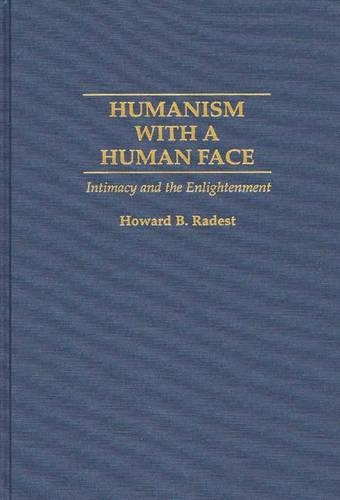
Humanism With a Human Face: Intimacy and the Enlightenment
(Hardback)
Publishing Details
Humanism With a Human Face: Intimacy and the Enlightenment
By (Author) Howard Radest
Bloomsbury Publishing PLC
Praeger Publishers Inc
30th June 1996
United States
Classifications
Tertiary Education
Non Fiction
144
Physical Properties
Hardback
224
Description
Beginning with the thesis that Humanism has its roots both in the Enlightenment and in Transcendentalism, this book explores the consequences of taking such a point of view. Radest criticizes the desertion of Enlightenment values such as freedom, human solidarity, and rationality, as well as the failure of Humanists to understand the subjective and emotional features of their history. Out of this exploration, which is a consequence of both personal experience and philosophic analysis, Radest concludes that Humanism, and by implication, modernism are still dynamic and relevant modes of response to the problems of human beings.
Reviews
In this sequel to his The Devil and Secular Humanism (1990), Radest continues to articulate his personal faith in humanism. The present book analyzes the contributions to humanism of transcendentalism. the author expresses his concerns about an antihumanistic spirit promulgated by fundamentalism, "new age," and "post-modernism." Humanism is approached from a historical and philosophical perspective, with references to writers such as Camus, Dewey, Dostoyevsky, Emerson, Fromm, Galbraith, Heidegger, Jung, Kant, Kierkegaard, Nietzsche, Sartre, Thoreau, and Tillich. Possibilities are offered for humanism as a viable philosophy in our age. Suitable for general audiences as well as graduate students and faculty.-Choice
"In this sequel to his The Devil and Secular Humanism (1990), Radest continues to articulate his personal faith in humanism. The present book analyzes the contributions to humanism of transcendentalism. the author expresses his concerns about an antihumanistic spirit promulgated by fundamentalism, "new age," and "post-modernism." Humanism is approached from a historical and philosophical perspective, with references to writers such as Camus, Dewey, Dostoyevsky, Emerson, Fromm, Galbraith, Heidegger, Jung, Kant, Kierkegaard, Nietzsche, Sartre, Thoreau, and Tillich. Possibilities are offered for humanism as a viable philosophy in our age. Suitable for general audiences as well as graduate students and faculty."-Choice
Author Bio
HOWARD B. RADEST is Adjunct Professor of Philosophy at the University of South Carolina-Beaufort. He is the founding Dean and now Dean Emeritus of The Humanist Institute. His books include Community Service: Encounter with Strangers (Praeger, 1993), The Devil and Secular Humanism (Praeger, 1990), and Can We Teach Ethics (Praeger, 1989).
